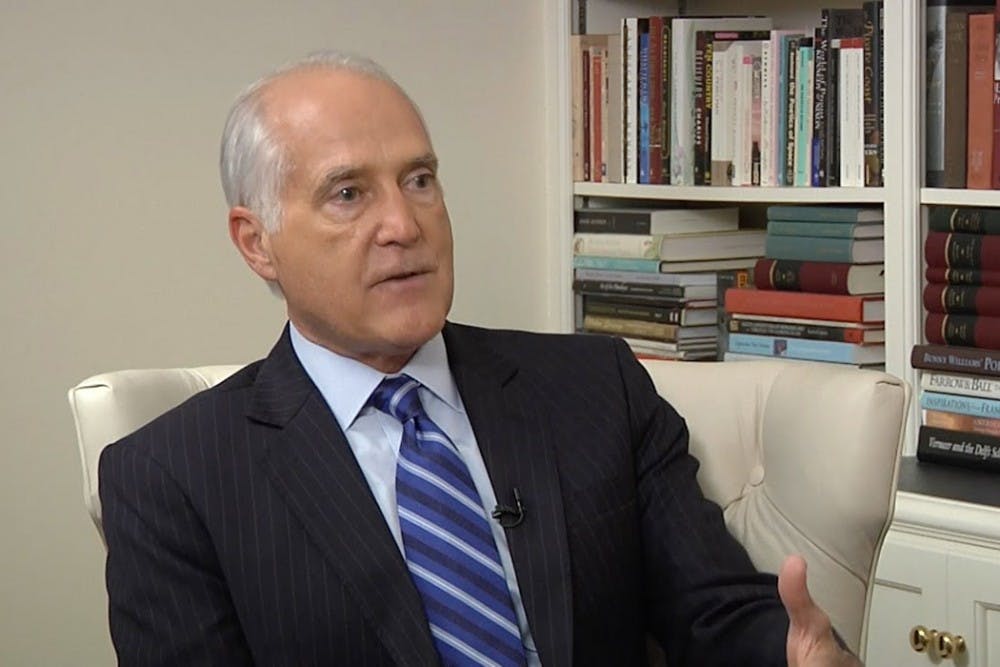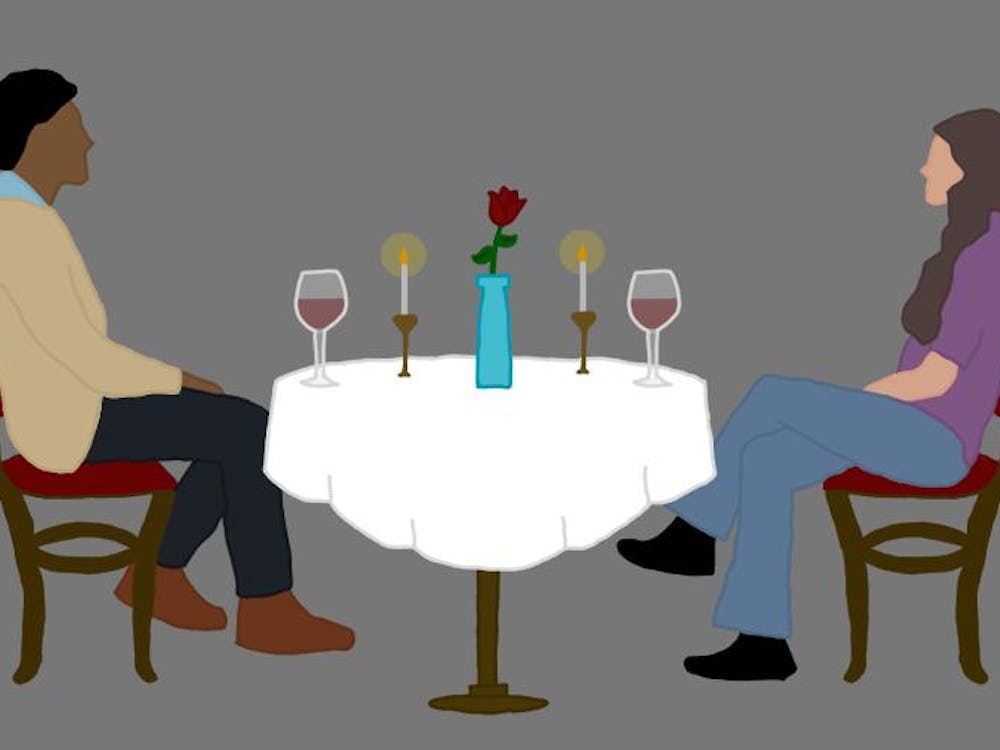Although many professors have a background in academia, students can also learn invaluable lessons from those who have worked in the professional workforce. Wyatt Andrews, a professor of practice in the Media Studies Department, has worked as a journalist for more than 40 years. After graduating from the University with a B.A. in Government and Foreign Affairs with honors in 1974, Andrews returned in the spring of 2016 to assist students in preparing to enter the media industry.
Why Andrews became a journalist
When Andrews entered the University, he aspired to become an attorney — not a journalist.
“To further my real-world education and learn the ability to think on my feet, all in the context of being a lawyer, I decided to cover the news at a local radio station,” Andrews said.
By his fourth year, Andrews worked 20 to 30 hours per week at the WUVA radio station, then operated out of the basement of Le Fevere. Though a low power radio broadcast with few listeners at the time, Andrews emphasized the high standards he and his team imposed on themselves.
“I spent probably 20 [to] 30 hours per week at the radio station, deeply getting into the editing and the how to write and [the] fairness of interviews and what I should ask in the interviews, and never saw it as work,” Andrews said. “It was finally an epiphany to me that what I really wanted to do was be a journalist. And that lightbulb moment was the epiphany of my life.”
From aspiration to career
Andrews then began working at Charlottesville Cable — a new local cable company. The company was looking for a student to fill a half hour broadcast on Friday evenings at 7:30 p.m.
“No one wanted to give up their Friday night [to do the broadcast], but I jumped at it, and I was able to persuade a news director in Richmond that the journalism I had done as a college radio student and my ability to look at the camera was enough for a job in Richmond,” Andrews said.
Although he prided himself on his ability to adapt quickly to a full-time position, Andrews quickly found out he had much to learn.
“I remember my first assignment to this day [as a] 21-year-old college graduate student with a degree in foreign affairs and college radio experience trying to pull off this job as a full-fledged Channel 6 reporter,” Andrews said.
Andrews was assigned to cover a murder trial, even though he didn’t know much about the court system beyond popular shows like “Perry Mason.” Andrews recalled the panic he felt in needing to understand and report upon the trial when not fully comprehending the case himself.
“Finally, there was a break, and I pushed the Commonwealth’s Attorney against the wall and I literally said. ‘I’m brand new at Channel 6, I have no idea what I’m doing, can you please tell me what’s going on?”, and he did,” Andrews said.
The experience left a lasting impression on Andrews.
“There are so many lessons there,” Andrews said. “The best news reporters anywhere in the world are not afraid to grab a source and say, ‘I don’t [know] anything about this, will you catch me up?’ and people appreciate that. I learned that when you had done the homework, it’s okay to fake it a little. You learn that in the first couple years of your profession, everyone’s faking it a little.”
After his time in Richmond, Andrews reported for two Florida news stations in the late 1970s and early 1980s. He joined CBS News in 1981 and began reporting for CBS, where he would become a foreign correspondent and travel overseas, most notably reporting from places like Tokyo, Moscow and London. As CBS’ State Department correspondent, Andrews covered the career of former Secretary of State George Shultz and worked as a backup White House correspondent to Leslie Stahl, a former anchor of “Face the Nation.”
A reflection on his career
Some of the biggest stories Andrews reported on included the 2008 election between Sen. John McCain and former president Barack Obama. When Andrews, along with other journalists, uncovered former Governor Sarah Palin’s “Bridge to Nowhere” scandal — discovering she did not deserve any of the credit she claimed for savings to the federal budget. As a result, CBS producers made Andrews the primary correspondent for the “Reality Check” segment on the Evening News, in which he analyzed and critiqued claims made by the presidential candidates and their respective running mates using hard facts.
“Any time McCain or Palin or Obama or Biden said something sketchy, we would do a very straight story, you know, ‘Here’s what they said, here’s why we’re fact checking it, here are the actual facts, here’s what we found, here are our sources’,” Andrews said. “It was very straight stuff and it was a very successful segment. The blogosphere was on fire, talking about how I would go after Republicans more than I would after Democrats, and that was tough because I faced internal criticism.”
Andrews said accusations of bias and dishonesty were difficult.
“I was raised in Catholic schools by a naval officer, and then I came to U.Va,” Andrews said. “These are three huge cultural forces in my life, all of which begin with ‘You always tell the truth.’”
Andrews also reflected on the technological innovations he has seen throughout his 41-year career as a journalist. Perched on a shelf, Andrews keeps a baby blue typewriter, which was used in most ’70’s newsrooms when he joined Channel 6 in Richmond.
“I actually keep it there to see how many students would ask about it because that is such old — almost pre-analog — to think about where we are now,” Andrews said. “One of the sad innovations that’s coming to the news industry in your lifetime is the news will be presented by a computer-generated robot, an animated creation.”
Second-year College student Molly Newell, who is currently enrolled in Andrews’ News Media class, said Andrews acknowledged the possible death of traditional news reporting in his lectures.
“I really like how he’s willing to integrate newer forms of media into the lectures,” Newell said.
Over the span of Andrews’ career, he developed an understanding about the world around him, characterizing this set of experiences as “the best career I could have possibly imagined.”
“I look back on the experiences I was able to have with tremendous humility and gratitude because I would remember … the North Vietnamese took us on an overland tour of North Vietnam to celebrate the 30th anniversary of Dien Bien Phu,” Andrews said. “And even though I’m eating rice cakes in the back of a really bad van overland on dirt roads for three days on the way to reach Dien Bien Phu, being fed nonstop propaganda by the North Vietnamese, I had this big smile on my face, feeling it to be a privilege. It was a sense of disbelief that someone was paying me to have these experiences.”
Today as a professor, Andrews teaches classes on multimedia reporting and the news media. In addition to teaching these classes, Andrews also hopes to instill in his students a sense of urgency in finding themselves and their passions.
“Treat the University like a buffet, looking for who the real you [is] through coursework,” Andrews said. “Apply the same thought that I did — what do you do that doesn’t feel like work? Is there something you do that, no matter how hard it is, you can’t wait to do it the next day? That’s an internal sign that that’s what you should be doing.”







